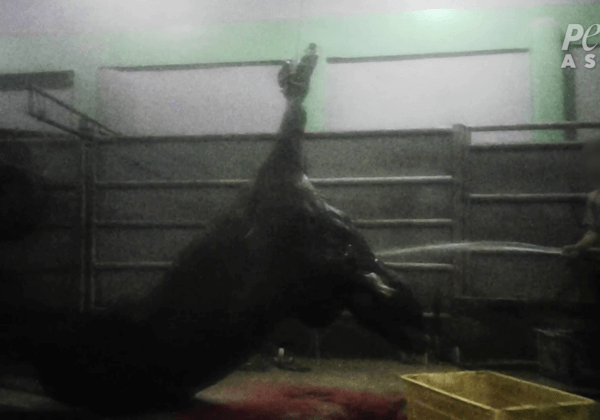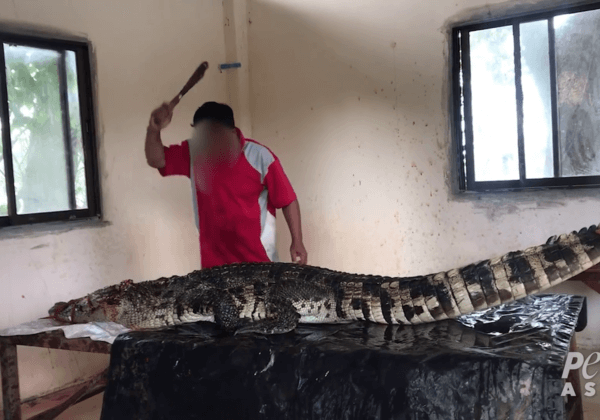PETA’s Work to Improve Animal Welfare in the Middle East
For decades, PETA has been helping improve the lives of animals in the Middle East. After PETA’s 2006 investigation helped thrust the horrific live-animal transport industry into the spotlight, we’ve continued to raise awareness of this crucial issue through exposés, protests, petitions, letter-writing campaigns, and leafleting and by enlisting the help of celebrities. We’ve held attention-grabbing demonstrations against live-animal transport in several Middle Eastern countries, including Bahrain, Egypt, Jordan, Kuwait, Lebanon, Syria, and the United Arab Emirates (UAE).
Around 4 million sheep are shipped from Australia to the Middle East and North Africa every year. PETA has helped generate public outrage, pressure for change, and widespread media coverage of live-animal transport, including after we offered to pay for the installation of webcams on all ships transporting live animals. In 2008, New Zealand ended its live-export trade, and we’ll continue to push other countries to follow suit.
PETA’s other work in the Middle East has been extensive. When the 2006 Lebanon War broke out between Hezbollah paramilitary forces and the Israeli military, we entered the war zone in order to help dogs, cats, and other animals who were tragically abandoned after government officials ordered people to evacuate. In 2020, when Beirut was devastated by an explosion, PETA’s Global Compassion Fund provided Animals Lebanon with financial support to assist the group in reuniting lost animals with their families. The fund also helped send a PETA U.K. rescuer to Beirut, where she worked in the city’s ruins, locating traumatized animals, providing them with care, and providing the animals’ guardians with dog and cat food. We also launched a campaign in Lebanon to encourage people to spay and neuter their companion animals.
In the UAE, we protested outside the Dubai Zoo, where animals suffer under the scorching sun for human entertainment, and outside Dubai’s Air France office because Air France is the only major airline in the world that still ships monkeys to be killed in laboratories. PETA’s also launched vegan campaigns in the Middle East, including in Syria and Jordan, and Jordanian boxing champion Arifa Bseiso also teamed up with PETA to encourage others to go vegan.
Jordanian boxing champion and Nike brand ambassador @ArifaB reveals how #vegan food fuels her in the ring: https://t.co/EpcWw7bALe #MondayMotivation 👊 pic.twitter.com/8rt7N0Lnei
— PETA Asia (@PETAAsia) July 9, 2018
We’ve helped save the lives of many pigs and goats in Egypt, Iran, Iraq, Jordan, the UAE, and several other countries. Thanks to PETA U.S.’s donation of state-of-the-art TraumaMan surgical simulators, these animals will no longer be cut apart and killed in medical training courses. TraumaMan replicates a breathing, bleeding human torso—complete with realistic layers of skin and tissue, ribs, and internal organs—so that training programs don’t have to use animals to teach doctors how to perform lifesaving surgical procedures.
PETA worked with actor Amy Samir Ghanem to call for kindness to donkeys in Egypt and Jordan, where they and other animals are forced to haul heavy loads and tourists under the blazing sun. Deprived of water and shade, donkeys, horses, and other working animals rarely get to rest and are almost never given vital veterinary care for their painful injuries. If you’re traveling to the Middle East, please skip these rides and instead offer water and fresh fruit to the overworked animals.

After our undercover investigation revealed egregious abuse at Egypt’s top tourist sites, we led a campaign to ban animal rides, which garnered the support of over 100,000 people. Following more than a year of pressure from PETA and our supporters, the country’s tourism ministry announced plans to ban camel and horse rides around the Giza pyramids and in the archaeological areas. Tourists will soon be able to use eco-friendly electric cars and buses, as we recommended.
PETA’s investigation also led to the arrest of three people for torturing camels at the Birqash Camel Market in Cairo.
After PETA’s investigations revealed that animals are beaten and abused to give tourists carriage rides around the Petra Archaeological Park in Jordan, the local government is launching a fleet of 20 electric vehicles to replace the carriages.
View this post on Instagram
PETA has also established a veterinary clinic just outside Petra—the only facility there that offers free emergency medical treatment to the hundreds of injured and abused donkeys, horses, and other working animals. One little donkey was suffering from badly infected wounds after being stabbed in the head. Wobbly, lethargic, thin, and severely dehydrated, he was near death when he was brought to the clinic. He was promptly given pain medication and antibiotics, and his wounds were cleansed and sutured. The treatment that he received that day is the only reason he survived. Our team also feeds hungry animals and provides their owners with crucial humane education to help instill respect and compassion for animals in them.
There’s still a great deal of work to be done for animals in the Middle East. Visit our Action Center to find out how you can help.
Interested in working with PETA? We’re hiring for a Campaign Coordinator for the Middle East, and Equine Veterinarian and a Veterinary Clinic Assistant or Manager at our Petra clinic.








